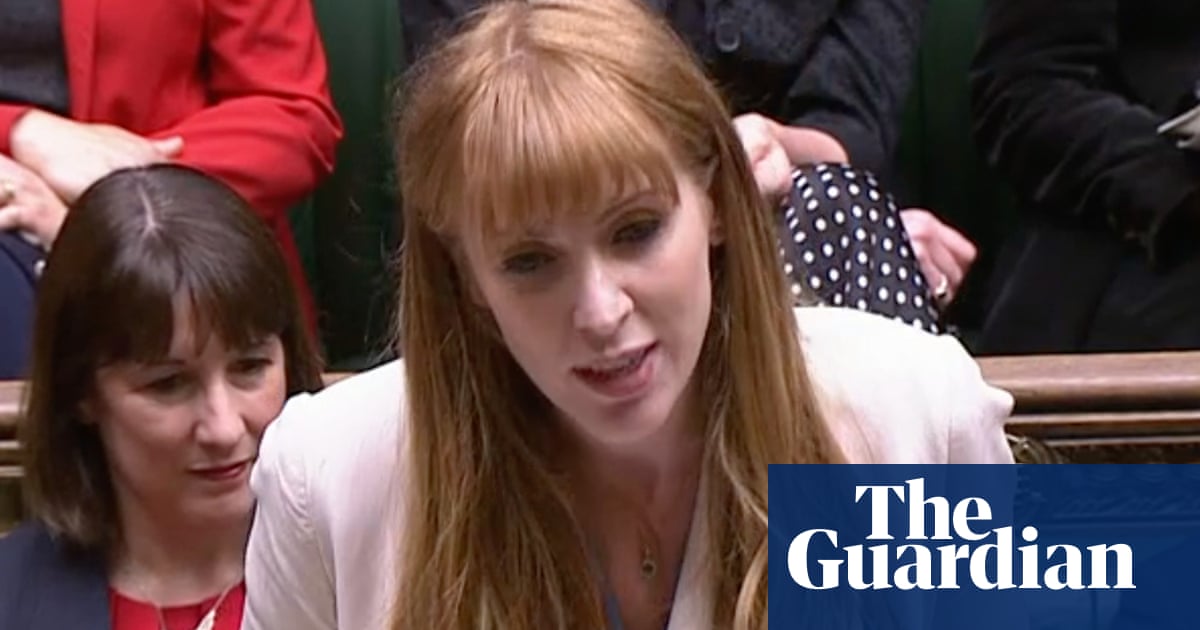
James Daly, the Tory MP who pestered the Greater Manchester police into reopening inquiries into Angela Rayner, rather gave the game away when he was tested on what he expected the detectives to be looking for. Asked several times in a broadcast interview, the party deputy chair floundered: “Certain matters… regarding certain things.” More Inspector Clouseau than Inspector Morse.
In their wildest dreams, this affair would culminate with the humiliating and shamefaced downfall of Labour’s deputy leader, but I don’t meet many Tories who really expect to get that result. They calculate that the relentless onslaught against Ms Rayner by the Conservative party, with the support of its collaborators in the rightwing media, will not be a wasted effort even if they don’t get her bang to rights and with no choice but to quit. It will still be a win for them, so Tories think, if they succeed in distracting and disrupting Labour. To an extent, they are achieving that goal. Under their breath, some shadow ministers wearily mutter their exasperation that so much of their time is being spent batting away the accusations against the deputy leader. It is eating up energy that Labour wanted to be spending on the May local government elections and the national contest that is only a bit further down the track. A day that was on the Labour grid for Sir Keir Starmer to project how he would defend the realm turned into one in which he was repeatedly pressed to defend his deputy. A day that Labour wanted to use to promote its housing policy became devoured by questions about Ms Rayner’s living arrangements and tax liabilities nine years ago.
Labour has struggled to shut down the attacks partly because of choices made by the leadership. Ms Rayner says she is in the possession of legal advice that exonerates her, but her defiant refusal to expose that advice to outside inspection has allowed her enemies to supplement their original accusations with further ones of obfuscation and evasiveness. The Labour leader says members of his team have looked at the advice and endorse his deputy’s assertion that she’s in the clear. Yet it is a head-scratcher that Sir Keir, by far the most experienced lawyer in his office, declines to clearly explain why he has not scrutinised the legal advice himself.
Before Tories get too overexcited, they ought to clock that things they hoped would happen have not. Labour has not cracked under pressure by allowing visible wedges to appear between Ms Rayner and colleagues. Rachel Reeves, Yvette Cooper and David Lammy, the three most senior members of the shadow cabinet after the leader, have circled their wagons around her. There’s a well-chronicled history of scratchy and mistrustful relations between Sir Keir and his deputy. She has said he would not be top of her invitation list to a karaoke party, perhaps accidentally endorsing the view that he is not the most exciting guy in the world. If her job were in his gift, not that of party members, there’s reason to doubt that she would be his first choice as number two. For all that, this stress test of their relationship appears not to have driven them apart, but drawn them closer together. Rather than putting distance between himself and his deputy, Sir Keir has put his own authority and credibility on the line with the steadfastness and increasing pugnacity with which he has stood up for her. When Rishi Sunak had a go at the most recent session of prime minister’s questions, the Labour leader jabbed back about “a billionaire prime minister” whose family “used schemes to avoid millions of pounds of tax, smearing a working-class woman”.
This is a kind of British version of ‘log cabin to the White House’, an appealing narrative of high achievement from an extremely challenging background
That line resonates within the Labour party and beyond. It is working to the advantage of Ms Rayner that there’s a whiff of misogyny and snobbery to some of the attacks on her. Among Labour members, she has probably never been more popular than she is now. Affection for her in the party, now allied with a determination to repel Tory assault, comes partly from admiration of her biography. One of the side-effects of this affair has been to give wider currency to the story that she has told of a poverty-stricken childhood caring for her bipolar and illiterate mother, leaving school at 16 while pregnant and without any GCSEs, working in care and rising through the union movement and then the Labour party to the brink of becoming deputy prime minister. This is a kind of British version of “log cabin to the White House”, an appealing narrative of high achievement from an extremely challenging background.
The central (and denied) allegation against Ms Rayner is that she should have but didn’t pay capital gains tax in the low four figures when she sold a house. This was set off by a book published under the name of Michael Ashcroft, big past donor to the Conservative party and a man extremely fond of Belize, the Caribbean coastal state that promoters laud as “the last great tax haven on Earth”. He’s been a non-dom. As has Mr Sunak’s wife, who exploited the privileges of non-dom status to swerve millions of pounds in UK taxes, giving it up only after this was exposed during her husband’s time as chancellor. One Tory who would probably prefer the Rayner affair to go away very quickly is Nadhim Zahawi. It is giving us cause to remember that the former Tory chancellor and ex-party chair was fired for serious breaches of the ministerial code by repeatedly failing to declare an HMRC investigation into his tax affairs. That concluded with a £5m settlement, including a penalty.
The belief that the pursuit of Ms Rayner reeks of Tory hypocrisy is not just to be heard from lifelong Labour partisans. The Times recently published a magnificently scornful letter from Nick Boles, a former Conservative MP, in which he accused his former party of “one of the most grotesque spectacles of hypocrisy I have witnessed… I suppose that her attackers cannot bear the idea that they are about to lose to a woman who pulled herself up by her bootstraps.”
Voters are realistic enough not to expect a Labour government to be a congregation of saints, but they already look at the Tories as a cesspit of sinners
Another thing the Conservatives might ask themselves is whether their prospects are going to be enhanced by making the conduct of politicians the primary electoral battlefield. Voters are realistic enough not to expect a Labour government to be a congregation of saints, but they already look at the Tories as a cesspit of sinners. For breaking the law, bullying civil servants, sexual predation and just about any other form of bad behaviour you can think of, the past 14 years has seen a huge rollcall of ministers who were fired or forced to jump before they were pushed.
Tory scandals are not just endless, they are increasingly mind-boggling. Hot on the heels of the lurid “honeytrap” affair, we have the suspension pending investigation of the Tory MP for Fylde, Mark Menzies. The accusations, which he denies, include ringing up an elderly aide in the middle of the night to beg for thousands of pounds to pay off “bad people” who were allegedly holding him for ransom by locking him in his flat. The Conservatives have been hammered at a series of byelections triggered by scandals involving their MPs. Yet another is imminent in Blackpool.
It seems rather unlikely to help Tory hopes of limiting their losses at the election if the outcome turns on the question of which of the parties is the sleaziest. So the stakes are not just high for Ms Rayner, but also for her accusers. Should the Greater Manchester police conclude that they have found evidence worthy of referral to prosecuting authorities, the pressure on her will be intense. If she should be found guilty of a criminal offence, she will have to make good on her pledge to step down as deputy leader. The contest to replace her would put Labour in peril of an eruption of factional competition and the exposure of internal tensions in its senior ranks. This destabilising scenario would, obviously, be regarded as peachy by the Tories.
The reverse will be the case should the Greater Manchester police conclude that they were right the first time when they said they could find no grounds for investigating Ms Rayner. That would amplify the charge that the Tories have wasted police resources in pursuit of a desperate and nasty attempt to deflect from their own failings and unpopularity by unjustly targeting a senior opposition politician. Then this affair would not be about her. It would be about the character, judgment and motives of the Conservative party and its leader.
Andrew Rawnsley is the Chief Political Commentator of the Observer












